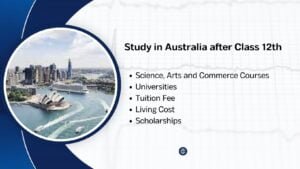Study in Australia for Indian Students after 12th

Studying in Australia after class 12th can be one of the best decisions one can take to shape his/her future, Australian Universities rank amongst the world’s best, like the University of Melbourne (top 30 globally) or the Australian National University (renowned for its Nobel Prize-winning alumni). Dive into cutting-edge research at institutions like Monash University, a leader in biomedical engineering, or immerse yourself in the entrepreneurial spirit at the University of Queensland, home to the world’s first business incubator. From trailblazing engineers like Wipro’s chairman Rishad Premji to Oscar-winning director George Miller, Australia’s alumni network is a testament to the transformative power of its education. Whether you’re drawn to the world-leading specialization in marine science at James Cook University or the innovative business analytics program at RMIT University, Australia offers a kaleidoscope of possibilities, each meticulously designed to ignite your intellectual curiosity and equip you with the skills to shape the future.
We have discussed different course options for Science, Commerce, and Arts Students after class 12th. Let us explore each one of them in detail.
Science Courses for Studying in Australia after 12th
| Course Name | Tuition Fee Per Year (INR Lakhs) | Course Duration | Popular Universities |
| Medical/Health | |||
| Bachelor of Medicine, Bachelor of Surgery (MBBS) | 50-80 | 5 years | University of Melbourne, University of Sydney, Monash University, University of Queensland |
| Bachelor of Biomedical Science | 15-25 | 4 years | University of NSW, University of Adelaide, Flinders University, Curtin University |
| Physiotherapy | 20-30 | 4 years | Macquarie University, La Trobe University, Deakin University, University of Western Australia |
| Nursing | 15-25 | 3-4 years | University of Technology Sydney, University of South Australia, Griffith University, RMIT University |
| Nutrition | 15-20 | 4 years | Deakin University, University of Queensland, Bond University, Murdoch University |
| Engineering & Technology | |||
| Bachelor of Engineering (Civil) | 15-25 | 4 years | University of Melbourne, UNSW Sydney, University of Queensland, Monash University |
| Bachelor of Engineering (Mechanical) | 15-25 | 4 years | University of Adelaide, University of Western Australia, RMIT University, Curtin University |
| Bachelor of Engineering (Electrical) | 15-25 | 4 years | University of NSW, Queensland University of Technology, Monash University, La Trobe University |
| Bachelor of Computer Science | 15-25 | 4 years | University of Melbourne, University of Sydney, University of Queensland, UNSW Sydney |
| Bachelor of Information Technology | 15-20 | 4 years | RMIT University, Monash University, University of Technology Sydney, Macquarie University |
| Other Science Fields | |||
| Bachelor of Science (Mathematics) | 15-20 | 4 years | University of Melbourne, University of Sydney, Australian National University, University of Adelaide |
| Bachelor of Science (Physics) | 15-20 | 4 years | University of Queensland, Monash University, UNSW Sydney, University of Western Australia |
| Bachelor of Science (Chemistry) | 15-20 | 4 years | University of Melbourne, University of NSW, RMIT University, Flinders University |
| Bachelor of Science (Psychology) | 15-20 | 4 years | University of Melbourne, Macquarie University, Monash University, University of Queensland |
| Veterinary Science | 30-40 | 5 years | University of Melbourne, University of Queensland, Murdoch University, James Cook University |
Management Courses for Studying in Australia after 12th
| Course Name | Tuition Fee Per Year (INR Lakhs) | Course Duration | Popular Universities |
| Bachelor of Business Administration (BBA) | 10-20 | 3-4 years | University of Melbourne, Monash University, University of Sydney, Macquarie University |
| Bachelor of Management | 12-18 | 4 years | University of Western Australia, Deakin University, La Trobe University, Swinburne University of Technology |
| Bachelor of Marketing | 12-18 | 4 years | University of Technology Sydney, Griffith University, Flinders University, Bond University |
| Bachelor of International Business | 15-20 | 4 years | University of Melbourne, UNSW Sydney, Monash University, University of Adelaide |
Commerce Courses for Studying in Australia after 12th
| Course Name | Tuition Fee Per Year (INR Lakhs) | Course Duration | Popular Universities |
| Bachelor of Commerce (BCom) | 10-15 | 3 years | University of Melbourne, University of Queensland, Monash University, Macquarie University |
| Bachelor of Accounting | 12-18 | 4 years | University of Sydney, RMIT University, Curtin University, Deakin University |
| Bachelor of Business | 10-18 | 3-4 years | UNSW Sydney, Australian National University, Griffith University, University of Western Australia |
| Bachelor of Finance | 12-18 | 4 years | La Trobe University, Swinburne University of Technology, Flinders University, Bond University |
| Bachelor of International Business | 12-20 | 4 years | University of Technology Sydney, University of Adelaide, Murdoch University, James Cook University |
| Bachelor of Economics | 10-15 | 3-4 years | University of Melbourne, University of Queensland, Australian National University, RMIT University |
Arts Courses for Studying in Australia after 12th
| Course Name | Tuition Fee Per Year (INR Lakhs) | Course Duration | Popular Universities |
| Creative Arts | |||
| Bachelor of Fine Arts (Honours) | 12-20 | 4 years | University of Melbourne, Monash University, UNSW Sydney, Curtin University |
| Bachelor of Design (Honours) | 12-18 | 4 years | RMIT University, University of Technology Sydney, Swinburne University of Technology, Queensland University of Technology |
| Bachelor of Music (Honours) | 15-25 | 4 years | University of Queensland, Melbourne Conservatorium of Music, Western Australian Academy of Performing Arts, Griffith University |
| Bachelor of Performing Arts (Honours) | 15-25 | 4 years | National Institute of Dramatic Art, Western Australian Academy of Performing Arts, Victorian College of the Arts, Queensland University of Technology |
| Bachelor of Film and Television | 15-25 | 4 years | University of Melbourne, Griffith University, Swinburne University of Technology, La Trobe University |
| Humanities | |||
| Bachelor of Arts (Honours) | 10-15 | 3-4 years | University of Sydney, University of Melbourne, Australian National University, University of Queensland |
| Bachelor of Literature | 12-18 | 4 years | University of Adelaide, Macquarie University, Flinders University, James Cook University |
| Bachelor of History | 10-15 | 3-4 years | University of Melbourne, Australian National University, RMIT University, Curtin University |
| Bachelor of Philosophy | 10-15 | 3-4 years | University of Queensland, Monash University, Macquarie University, La Trobe University |
| Bachelor of Linguistics | 12-18 | 4 years | University of Melbourne, La Trobe University, University of Western Australia, Flinders University |
| Social Sciences | |||
| Bachelor of Psychology (Honours) | 15-25 | 4 years | University of Melbourne, Macquarie University, Monash University, University of Queensland |
| Bachelor of Social Work | 12-18 | 4 years | RMIT University, University of Sydney, Deakin University, University of South Australia |
| Bachelor of Education (Honours) | 12-18 | 4 years | University of Melbourne, Deakin University, Macquarie University, La Trobe University |
| Bachelor of Communications (Honours) | 10-18 | 4 years | University of Queensland, RMIT University, Curtin University, Griffith University |
| Bachelor of International Relations | 12-18 | 4 years | University of Melbourne, Monash University, University of Queensland, Deakin University |
Average Living Cost in Australia:
- Low budget: ₹5-6 lakhs per year. This is possible through shared accommodation, cooking most meals at home, minimizing entertainment expenses, and taking advantage of free student activities.
- Moderate budget: ₹7-9 lakhs per year. This allows for more flexibility in housing options, occasional eating out, and some leisure activities.
- Comfortable budget: ₹10-12 lakhs per year. This opens up options for private studios or shared apartments in good locations, more frequent dining out and travel, and participation in paid hobbies.
Study Gap Acceptable in Australia after Class 12th
In general, most Australian universities will accept applications from students who have taken up to two years off after high school. However, if you have taken a longer gap year, it is important to be prepared to explain your reasons for doing so and how it has benefited you.
Eligibility Criteria for Indian Students to Study in Australia after Class 12th:
Academic Qualification:
- Minimum Marks: Generally, 60-65% aggregate marks in Class 12th CBSE or state board exams. Some competitive programs may require higher scores (70-80%).
- Subject Requirements: Specific subject prerequisites might exist for some courses, especially in Science and Engineering fields.
- Grade System: If your education system uses a different grading system, ensure you have official conversion documents to an equivalent percentage system.
Course-Specific Eligibility Requirements:
Engineering:
- Minimum Marks: 65-75% aggregate in Class 12th with Physics, Chemistry, and Mathematics. Some highly competitive programs may require 80% or higher.
- Subject Requirements: Physics, Chemistry, and Mathematics are mandatory subjects. Some universities may also require additional subjects like Biology or Computer Science depending on the specific engineering program.
- Entrance Exams: Some universities might require additional entrance exams like UCAT (University Clinical Aptitude Test) for biomedical engineering.
Business Management:
- Minimum Marks: 60-65% aggregate in Class 12th with any subjects. However, strong scores in Mathematics and Commerce are preferred.
- Entrance Exams: Not typically required, but some universities might consider GMAT or GRE scores for postgraduate studies.
- Additional Requirements: Some programs may require specific prerequisites like accounting or business studies in Class 12th.
MBBS (Medicine, Bachelor of Surgery):
- Minimum Marks: 80-85% aggregate in Class 12th with Physics, Chemistry, and Biology.
- Entrance Exams: Indian students must qualify for NEET (National Eligibility cum Entrance Test) with a high score. Some universities might also require the UMAT (Undergraduate Medical Admission Test).
- Additional Requirements: Strong academic record, excellent English language skills, and evidence of strong motivation to pursue medicine are typically required.
Computer Science:
- Minimum Marks: 65-70% aggregate in Class 12th with Mathematics and preferably Physics or Computer Science.
- Entrance Exams: Not typically required for undergraduate programs, but some universities might consider GMAT or GRE scores for postgraduate studies.
- Additional Requirements: Some programs may require specific prerequisites like computer programming or algorithms in Class 12th.
English Language Proficiency:
- Test Scores: Pass an English language proficiency test like IELTS or TOEFL with minimum band scores. Typical range for undergraduate degrees is 6.5-7.0, but specific requirements vary.
- Alternatives: Some universities may accept alternative proof of English proficiency, such as high school English grades or completion of English-medium programs.
Additional Requirements:
- Academic References: Strong academic references from teachers or counselors are often required.
- Statement of Purpose: A well-written statement explaining your study goals and motivation for choosing the specific program is crucial.
- Extracurricular Activities: Though not always mandatory, involvement in extracurricular activities can strengthen your application.
Visa Requirements:
- Genuine Temporary Entrant (GTE) criteria: You must demonstrate your intention to return to India after completing your studies.
- Financial documents: Proof of sufficient funds to support your studies and living expenses is required, at present, this average amount works out between Rs21 Lakhs to 37Lakhs approximately.
- Other visa formalities: Additional documents and procedures may apply depending on your visa category.
Scholarships for Indian Students in Australia:
Australia Awards Scholarships (AAS):
- Amount: Full tuition fees, travel costs, health insurance, living allowance, and other program costs.
- Who can apply: High-achieving Indian students from diverse backgrounds seeking undergraduate or postgraduate degrees in any field.
- Coverage: Covers all the essential expenses for the duration of your studies.
- Selection criteria: Academic merit, development potential, leadership qualities, and commitment to contributing to India’s development.
- Deadline: Round 1: 31 August 2023, Round 2: 15 April 2024.
Endeavour Postgraduate Scholarship Award:
- Amount: Up to $37,396 per year for Masters, $42,832 per year for PhD, plus travel allowance and health insurance.
- Who can apply: High-achieving Indian students seeking postgraduate studies in science, technology, engineering, mathematics, health, education, environment, business, agriculture, and public policy.
- Coverage: Tuition fees, living allowance, travel costs, and health insurance.
- Selection criteria: Academic excellence, research potential, leadership qualities, and potential contribution to Australia and India.
- Deadline: April 30, 2024.
Destination Australia Scholarship:
- Amount: $15,000 per year for undergraduate and $20,000 per year for postgraduate studies.
- Who can apply: Indian students applying for specific courses at participating regional universities in Australia.
- Coverage: Partial tuition fee contribution and living expenses support.
- Selection criteria: Academic merit, potential to contribute to regional Australia, and commitment to returning to India upon completion of studies.
- Deadline: Varies depending on the participating university.
John Allwright Fellowship (JAF):
- Amount: Up to $30,000 per year for a maximum of three years.
- Who can apply: Early-career researchers from India in the fields of science, technology, engineering, and mathematics (STEM) seeking research collaboration with Australian researchers.
- Coverage: Research and living expenses support.
- Selection criteria: Research excellence, potential impact of the research collaboration, and potential to contribute to India’s development.
- Deadline: March 31, 2024.
Australia-India Strategic Research Fund (AISRF):
- Amount: Funding varies depending on the research project.
- Who can apply: Indian researchers collaborating with Australian researchers on projects aligned with India-Australia strategic interests.
- Coverage: Research project costs, travel, and living expenses.
- Selection criteria: Scientific merit, potential impact of the research, and alignment with India-Australia strategic priorities.
- Deadline: Rolling applications throughout the year.
Read more such Interesting articles on Study Abroad on our Facebook Page




